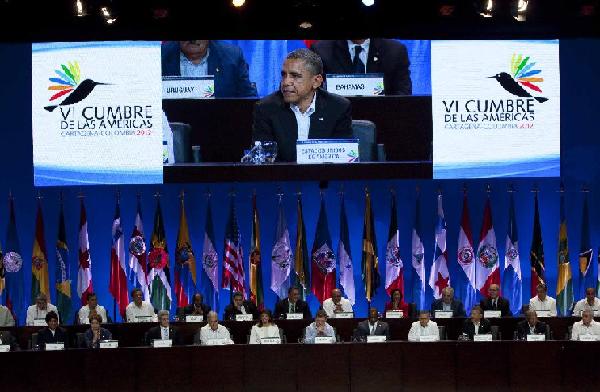Sixth Americas summit opens
 0 Comment(s)
0 Comment(s) Print
Print E-mail Xinhua, April 15, 2012
E-mail Xinhua, April 15, 2012
The sixth Summit of the Americas, a gathering of 31 heads of state and government from the Western Hemisphere, opened in Colombia's Caribbean resort city of Cartagena on Saturday.
 |
| U.S. President Barack Obama (on the screen) and other delegates attend the opening ceremony of the Sixth Summit of the Americas in Cartagena, Colombia, April 14, 2012. The Sixth Summit of the Americas, a gathering of heads of state and government from the Western Hemisphere, opened in Colombia's Caribbean resort city of Cartagena on Saturday. [Eliana Aponte/Xinhua] |
The two-day event, with a central theme of "Connecting the Americas: Partners for Prosperity," offers regional leaders including U.S. President Barack Obama and Brazilian President Dilma Rousseff a platform to discuss policy issues of common interest and outstanding challenges like development and security.
Some controversial issues are also likely to be brought up during the leaders' meetings and discussions, such as Cuba's re- admission to the Organization of American States (OAS) and presence at future Americas summits, as well as proposed changes to drug control policies in some Central American states.
Political analysts note that the United States and Canada are often at odds with most of the Latin American nations over these issues, making it hard for the leaders to reach a consensus.
Addressing the opening session of the summit, Colombian President Juan Manuel Santos called for efforts to overcome the differences over Cuba, an issue that has long roiled U.S. relations with Latin American countries.
He dismissed "isolation" and "embargo" against Cuba, calling it "an anachronism that keeps us anchored to an outdated Cold War era. "
"We cannot be indifferent to the process of change that is going on in Cuba. It is time to overcome our differences so that this process can receive support," he said.
He expressed hope that Cuba would be present at the next summit, saying its absence then would be "unthinkable."
Alicia Barcena, executive secretary of the UN Economic Commission for Latin America and the Caribbean, also called for all the 35 countries of the Western Hemisphere to be included in future summits so as to enhance and consolidate the inter-Amercan dialogue.
Due to Washington's opposition, Cuba is shut out from the summit for the sixth time, an act that prompted Ecuadorian President Rafael Correa to stay away from the event in protest.
Venezuelan President Hugo Chavez, who is battling cancer, and Nicaraguan President Jose Daniel Ortega are absent from the summit as well.
Cuba was suspended from the OAS in 1962 at the height of the Cold War. The suspension was officially lifted in 2009, but the country has chosen not to return to the pan-American bloc.
In addition, President Santos urged his peers to stop stalling and re-examine the approaches to the fight against drug trafficking "without dogma, without prejudice," by looking at " different scenarios and possible alternatives."
Drug trafficking breeds organized crime and violence in Latin America, Mexico and Central America in particular, and there is a growing consensus that the root cause lies in the massive use of narcotics in the United States and an unending flow of money and weapons southward to drug cartels.
The Obama administration has acknowledged its shared responsibility and consented to a debate on the issue at the summit, but said "no" to the idea of legalizing and decriminalizing drugs as proposed by some Central American leaders.
"This summit is not going to resolve this issue, but it can be a starting point to begin a discussion that we have been postponing for far too long," Santos said.
Stating that all countries are equal, the president said the United States has learned that it alone cannot bear "the entire brunt" of keeping the world in balance and in peace.
At the last summit in Trinidad and Tobago in April 2009, Obama pledged to pursue an equal partnership with Latin American countries, stating that "There is no senior partner and junior partner in our relations, there is simply engagement based upon mutual respect, common interests and shared values."






Go to Forum >>0 Comment(s)